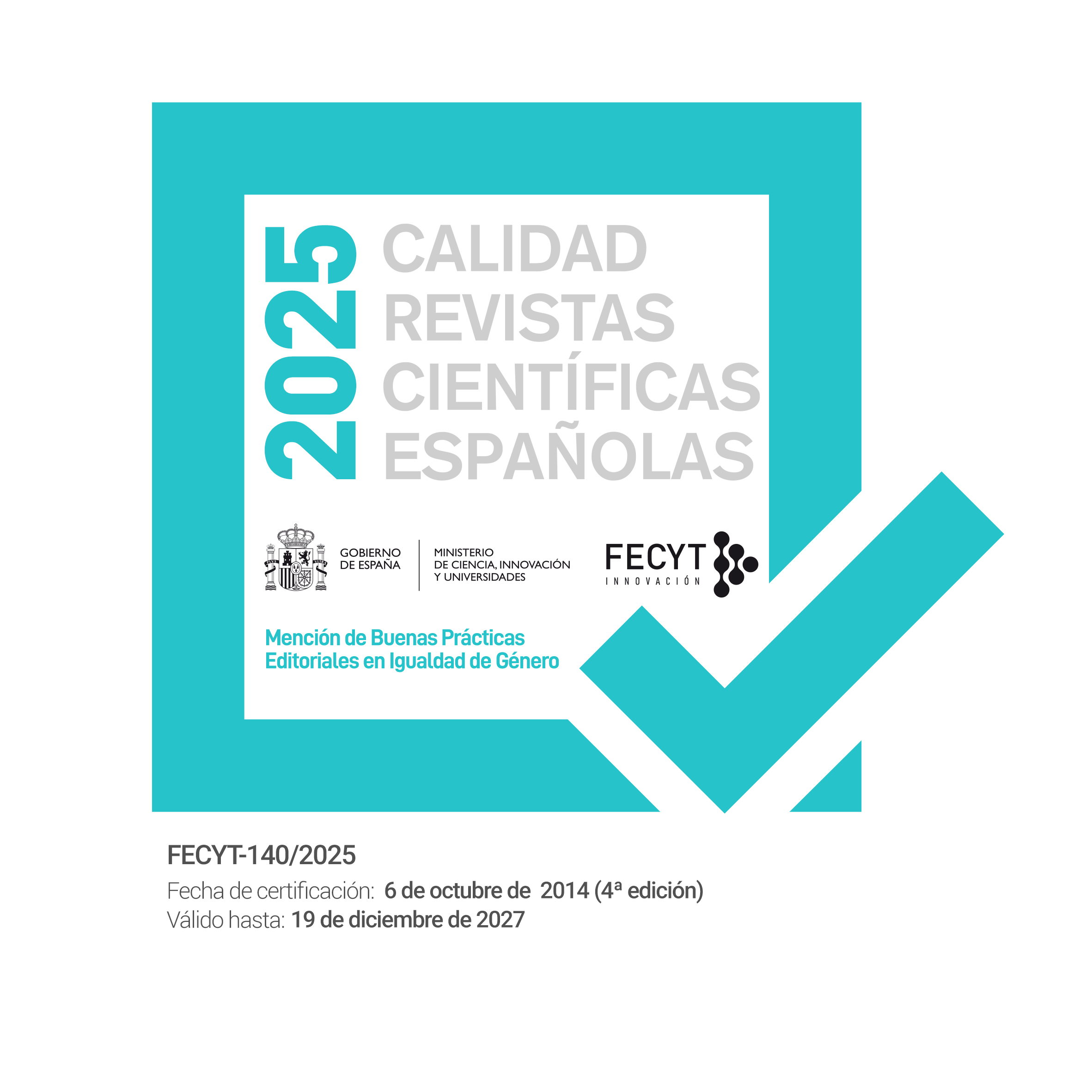INFLUENCE OF SOCIO-DEMOGRAPHIC PROFILE OF TEACHERS ON THEIR LEVELS OF EMOTIONAL INTELLIGENCE AND BURNOUT
DOI:
https://doi.org/10.5944/educxx1.22514Keywords:
Emotional intelligence, burnout, emotional competences, teacher, researcher, university.Abstract
The educational guidelines, derived from the convergence of theEuropean Higher Education Area (EHEA), require new competences of
teachers and researchers at the university. These demands give rise to
challenges or personal difficulties for teachers, since the work environment
can overwhelm them and may cause the appearance of the well-known
«burnout» syndrome. Much of that unease is linked to unfulfilled job
expectations and an imbalance between the emotional competences and
emotional demands required as teachers. Emotional intelligence acts as a
preventative factor in this professional unease, explaining why there are
teachers who are tougher than others when it comes to the stressful factors
of the profession. This research evaluates the emotional condition and
burnout among teachers and researchers at the University of Las Palmas de Gran Canaria (ULPGC), using as instruments the TMSS-24 and the MBI-GS, and at the same time establishing a connection between the levels of these constructs with the influence of the demographic profile of teachers and researchers. The results of the SEM indicate that the perceived emotional intelligence does cause a significant negative effect on emotional exhaustion and a significant positive effect on professional efficacy. Moreover, there is a significant positive effect between emotional exhaustion and cynicism.
Based on the information analyzed, it gives way to a reflection on the
emotional and professional situation of the teachers, emphasizing mainly the differences according to gender, since women show not only higher levels of understanding and emotional regulation but also greater levels of exhaustion and cynicism, as well as differences in the area of knowledge, since the PDI of Art and Humanities presents not only high levels of emotional perception but also of exhaustion and cynicism. It is worth highlighting the results related to work experience since it is proven that the higher the number of years of experience, the higher the level of cynicism.
Downloads
References
Anderson, J.C., & Gerbing, D.W. (1988). Structural equation modeling in practice: A review and recommended two-step approach. Psychological Bulletin, 103(3), 411.
Augusto-Landa, J.M., López-Zafra, E., Berrios-Martos, M. P., & Pulido-Martos, M. (2012). Analyzing the relations among perceived emotional intelligence, affect balance and burnout. Psicología Conductual, 20(1), 151.
Avargues, M., Borda, M., y López, A. (2010). El core of burnout y los síntomas de estrés en el personal de universidad. prevalencia e influencia de variables de carácter sociodemográfico y laboral. Boletín de Psicología, 99(1), 89-101.
Bresó, E., Salanova, M., Schaufeli, W., y Nogareda, C. (2007). Síndrome de estar quemado por el trabajo «Burnout» (III): Instrumento de medición. Nota Técnica De Prevención, 732, 21ª Serie. Instituto Nacional de Seguridad e Higiene en el Trabajo.
Recuperado de https://bit.ly/1loRhDq
Cao, M.L.F. (2015). Cognición y emoción: El derecho a la experiencia a través del arte. PULSO. Revista De Educación, 31, 221-232.
Cladellas, R., y Castelló, A. (2011). Percepción del estado de salud y estrés, de profesorado universitario, en relación con la franja horaria de docencia. Electronic Journal of Research in Educational Psychology, 9(1), 217-240.
Díaz-Barriga, A., y Luna, A.B. (2014). Metodología de la investigación educativa: Aproximaciones para comprender sus estrategias. México DF, México: Ediciones Díaz de Santos.
Extremera, N., y Fernández-Berrocal, P. (2005). Inteligencia emocional y diferencias individuales en el metaconocimiento de los estados emocionales: una revisión de los estudios con TMMS. Ansiedad y Estrés, 11, 101-122.
Extremera, N., y Fernández-Berrocal, P. (2015). Inteligencia emocional y educación: Psicología. Madrid: Editorial Grupo5.
Fernández-Berrocal, P., Berrios-Martos, M.P., Extremera, N., y Augusto, J.M. (2012). Inteligencia emocional: 22 años de avances empíricos. Psicología Conductual, 20(1), 5-13.
Fernandez-Berrocal, P., Extremera, N., & Ramos, N. (2004). Validity and reliability of the Spanish modified version of Trait Meta-Mood Scale. Psychological Reports, 94(3), 751-755.
Gil-Monte, P.R. (2005). Factorial validity of the Maslach Burnout Inventory (MBI-HSS) among Spanish professionals. Revista de Saúde Pública, 39(1), 1-8.
Granados, L., Sanmartín, R., Lagos, N., Urrea-Solano, M., y Hernández- Amorós, M.J. (2017). Diferencias en burnout según sexo y edad en profesorado no universitario. International Journal of Developmental and Educational Psychology. Revista INFAD de Psicología., 2(1), 329-336.
doi: http://dx.doi.org/10.17060/ijodaep.2017.n1.v2.945
Guaderrama, A.I.M., Arroyo, J.C., y Flores, G.R. (2017). Efecto de la violación del contrato psicológico y el agotamiento emocional sobre el cinismo del empleado. Estudios Gerenciales, 33(143), 124-131.
Ingellis, A.G., y Lahiguera, C.P. (2016). Análisis de un modelo de tutorización de Trabajos Fin de Grado (TFM) en el Espacio Europeo de Educación Superior: una aplicación en el Grado de Relaciones Laborales y Recursos Humanos. Lan Harremanak. Revista de Relaciones Laborales, 32, 527-552. doi: 10.1387/lan-harremanak.15445
León-Rubio, J.M., Cantero, F.J., y León-Pérez, J.M. (2011). Diferencias del rol desempeñado por la autoeficacia en el burnout percibido por el personal universitario en función de las condiciones de trabajo. Anales de Psicología, 27(2), 518-526.
López, E., Pulido, M., y Augusto, J. M. (2013). Inteligencia emocional en el trabajo. Madrid: Editorial Síntesis. Maslach, C. & Jackson, S. E. (1986). MBI: Maslach burnout inventory; manual research edition. California, USA: Consulting Psychologists Press.
Maslach, C., Jackson, S. E., & Leiter, M. P. (1996). Maslach burnout inventory. Evaluating Stress: A Book of Resources, 3, 191-218.
Maslach, C., Schaufeli, W.B., & Leiter, M.P. (2001). Job burnout. Annual Review of Psychology, 52(1), 397-422.
Mathieu, J.E., & Taylor, S.R. (2006). Clarifying conditions and decision points for mediational type inferences in organizational behavior. Journal of Organizational Behavior, 27(8), 1031-1056.
Mayer, J.D., & Salovey, P. (1995). Emotional intelligence and the construction and regulation of feelings. Applied and Preventive Psychology, 4(3), 197-208.
Mayer, J.D., Salovey, P., & Caruso, D.R. (2004). Emotional intelligence: theory, findings and implications. Psychological Inquiry, 15, 197-215.
Mestre, J.M. y Fernandez-Berrocal, P. (2009). Manual de inteligencia emocional. Madrid: Editorial Pirámide.
Otero López, J.M. (2012). Estrés laboral y burnout en profesores de Enseñanza Secundaria. Madrid: Ediciones Díaz de Santos.
Palomera, R., Gil-Olarte, P., y Brackett, M. (2006). ¿Se perciben con inteligencia emocional los docentes?: Posibles consecuencias sobre la calidad educativa. Revista de Educación, 341, 687-704.
Riesco, M. (2015). El enfoque por competencias en el Espacio Europeo de Educación Superior (EEES) y sus implicaciones en la enseñanza y el aprendizaje. Tendencias Pedagógicas, 13, 79-106.
Ruano, A.; Pena, M.; Rey, L. & Extremera, N. (2012). Life Satisfaction and Engagement in Elementary and Primary Educators: differences in Emotional Intelligence and Gender. Revista de Psicodidáctica, 598-599.
Salovey, P. & Mayer, J. (1990). Emotional intelligence. Imagination, cognition, and personality, 9, 185-211.
Salovey, P., Mayer, J.D., Goldman, S.L., Turvey, C., & Palfai, T.P. (1995). Emotional attention, clarity, and repair: Exploring emotional intelligence using the Trait Meta-Mood Scale. In J.W. Pennebaker (Ed.), Emotion, disclosure, & health (pp. 125-154). Washington, USA: American Psychological Association.
Sánchez-Fernández, M., y Clavería, M. (2005). Profesorado universitario: estrés laboral. factor de riesgo de salud. Enfermería Global, 4(1), 1-16.
Uskola, A., Madariaga, J.M., Arribillaga, A., Maguregi, G., Romero, A., y Fernández, M. (2015). Propuesta e implementación de un plan de tutorización de una tarea interdisciplinar universitaria de carácter modular. REDU. Revista de Docencia Universitaria, 13(2), 207-232.
Velayos, I., Cuadrado, C., Durán, C., Fernández, M., López, V., Ochoa, V., Rizo, S.; Ruiz de la Cuesta, P., y Santa Isabel, P. (2016). Metodología para tutorización y elaboración de trabajos de fin de grado en las líneas de Derecho procesal propuestas en las titulaciones - EEES de la Universidad de Alicante. Alicante: Universidad de Alicante.
Downloads
Published
How to Cite
Issue
Section
License
Copyright (c) 2019 Educación XX1

This work is licensed under a Creative Commons Attribution-NonCommercial 4.0 International License.
Educación XX1 is published under a Creative Commons Attribution-NonCommercial 4.0 (CC BY-NC 4.0)










